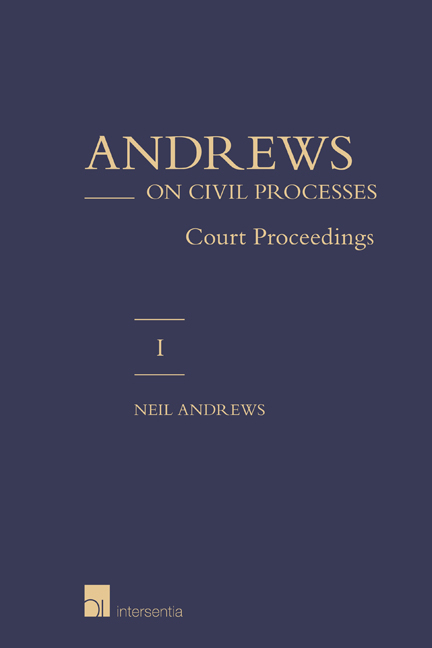Book contents
- Frontmatter
- Dedication
- Epigraph
- Preface
- Contents
- Table of Cases
- Table of Statutes
- Table of Statutory Instruments
- PART I INTRODUCTION TO THE FORMS OF CIVIL JUSTICE
- PART II COMMENCEMENT OF COURT PROCEEDINGS AND PREPARATION FOR TRIAL
- Chapter 4 The Six Phases of Court Proceedings
- Chapter 5 Commencement and Service
- Chapter 6 Pleadings and Parties
- Chapter 7 Counterclaims and Set-Off
- Chapter 8 Limitation of Actions
- Chapter 9 Case Management and Procedural Discipline
- Chapter 10 Pre-Trial Termination of Actions Without Settlement: Interim, Summary, Default, Preliminary and Striking Out Procedures
- Chapter 11 Disclosure
- Chapter 12 Privileges
- Chapter 13 Experts
- PART III END-GAME: TRIAL, APPEAL, FINALITY AND ENFORCEMENT
- PART IV COSTS AND FINANCING OF LITIGATION
- PART V SPECIAL PROCEEDINGS
- PART VI PRINCIPLES OF CIVIL LITIGATION
- PART VII THE EUROPEAN CONTEXT
- Select Bibliography
- Index to Volumes I and II
Chapter 10 - Pre-Trial Termination of Actions Without Settlement: Interim, Summary, Default, Preliminary and Striking Out Procedures
from PART II - COMMENCEMENT OF COURT PROCEEDINGS AND PREPARATION FOR TRIAL
Published online by Cambridge University Press: 13 December 2017
- Frontmatter
- Dedication
- Epigraph
- Preface
- Contents
- Table of Cases
- Table of Statutes
- Table of Statutory Instruments
- PART I INTRODUCTION TO THE FORMS OF CIVIL JUSTICE
- PART II COMMENCEMENT OF COURT PROCEEDINGS AND PREPARATION FOR TRIAL
- Chapter 4 The Six Phases of Court Proceedings
- Chapter 5 Commencement and Service
- Chapter 6 Pleadings and Parties
- Chapter 7 Counterclaims and Set-Off
- Chapter 8 Limitation of Actions
- Chapter 9 Case Management and Procedural Discipline
- Chapter 10 Pre-Trial Termination of Actions Without Settlement: Interim, Summary, Default, Preliminary and Striking Out Procedures
- Chapter 11 Disclosure
- Chapter 12 Privileges
- Chapter 13 Experts
- PART III END-GAME: TRIAL, APPEAL, FINALITY AND ENFORCEMENT
- PART IV COSTS AND FINANCING OF LITIGATION
- PART V SPECIAL PROCEEDINGS
- PART VI PRINCIPLES OF CIVIL LITIGATION
- PART VII THE EUROPEAN CONTEXT
- Select Bibliography
- Index to Volumes I and II
Summary
INTRODUCTION
All these procedures precede trial. Interim relief exists to supply short term relief, pending the case's final resolution at trial, whereas the aim of summary judgment, striking out and default judgment is to dispose speedily of the entire case. Protective relief (21.01 ff) does not concern the substance of the case but instead preservation of assets or evidence in order to keep open the prospect of achieving eventual full justice.
Interim Relief: An interim judgment can take one of two main forms. If the claimant is seeking an injunction or specific performance at trial, the court can order a pre-trial interim injunction (or an ‘interlocutory injunction’). If the claimant is seeking pecuniary relief at trial, the court can make an interim order for the payment of a debt or a proportion of the damages likely to be awarded at trial.
Accelerated Final Judgment: The two main cases of accelerated final judgment are judgment by default and summary judgment.
Judgment by default takes place when the defendant fails to defend or indicates that it is unwilling to defend.
Summary judgment (under CPR Part 24) is awarded if the claimant or defendant has ‘no real prospect’ of success at trial. And when the court strikes out a party's defence or claim, the result is that this party has effectively lost the case, and so this process is tantamount to ‘final judgment’, even though in some situations a claimant remains free to bring a fresh action concerning the same cause of action. For this reason, striking out procedure is included within this chapter.
INTERIM PAYMENTS
Interim payments were at first confined to protecting claimants in personal injury or fatal accident claims. In 1978 the system of interim payments was expanded to cover all damages or debt claims. An interim payment order enables the claimant to obtain advance payment, oft en well before trial.
The payment will be a ‘reasonable proportion’ of the claim. The court can order an interim payment if the defendant has admitted liability, or judgment on the question of liability has already been obtained, or the court ‘is satisfied’ that, if the case went to trial, the claimant would obtain judgment for a ‘substantial’ monetary award against the defendant, other than costs.
- Type
- Chapter
- Information
- Andrews on Civil ProcessesCourt Proceedings, pp. 213 - 260Publisher: IntersentiaPrint publication year: 2013

